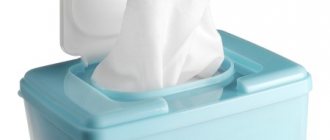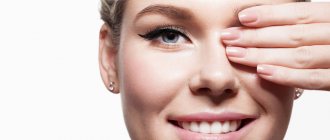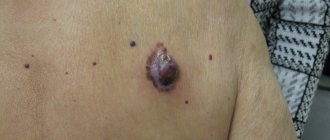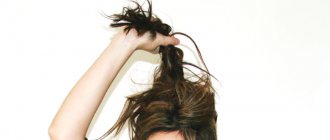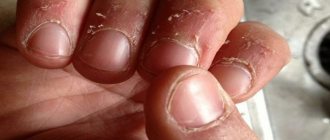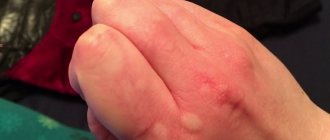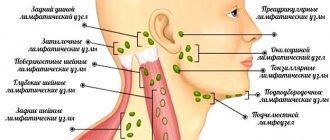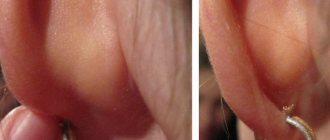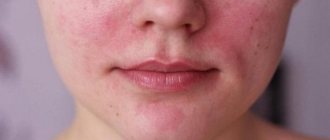Determining your skin type
There is a myth that only dry scalp can flake and itch, however, this is not entirely true. For example, dandruff, which in turn is one of the causes of itching, can be caused by both increased oily skin and dryness. Determining your skin type is quite simple. You need to take a white paper napkin and rub it for 25 seconds. on the scalp. If there is a greasy mark on the napkin, you can assume that you have oily hair type. If the napkin is still dry, then most likely you have either combination or dry scalp. What to do now? You need to be guided by the ends of your hair; if they are dry and too split, then you undoubtedly have a dry type, and if the ends are oily, you have a combination type.
Using Shampoos to Treat Itching
Medicinal shampoos containing panthenol and allantoin are the simplest method of treating scalp itching.
They:
- cleanse skin and hair;
- eliminate itching, relieving the fungus and the irritation caused by it;
- normalize the functioning of the sebaceous glands;
- will speed up the healing of scratches and restore the structure of the skin.
The most popular shampoos are:
| Means | Description |
| IdHair Solutions№3 | A mild shampoo designed for hair of all types that can effectively eliminate itching caused by:
|
| Kerium, La Roche-Posay | Eliminates dryness and flaking of the scalp. |
| Kerium DS, La Roche-Posay | The product contains salicylic acid, which actively fights dandruff and excessive oiliness. Relieves inflammation and eliminates itching. |
| Friderm Tar | Shampoo based on birch tar, which is famous for the following qualities:
|
| Friederm Zinc | The product will relieve oily seborrhea, which is localized in the occipital region. It is an antifungal and anti-inflammatory drug. |
| Paranix | Anti-lice shampoo that will get rid of lice and nits in a few minutes. To do this, you only need to apply the product to dry hair and wash your hair after 15 minutes. |
Parasites attack
The first reason why itching may occur is the presence of lice and mites on a person’s head. These parasites are now very common. In public transport, in the forest, they very easily penetrate human skin, but they are difficult to notice. Ask relatives or friends to carefully examine you to remove suspicion from this cause. If you do find a tick, you should immediately consult a doctor, since it is not always possible to remove it from the skin on your own.
Healing hand baths
In addition to medications and good nutrition, you need to carry out caring procedures for your hands that will give the skin special softness, heal all wounds and cracks on it and make it more attractive. Do you think this effect can only be achieved in a beauty salon? Not at all! There are many homemade and healthy recipes.
With vitamins
Ingredients:
- vitamin A, E – 1 capsule;
- olive oil – 1 tablespoon;
- lemon juice - a few drops.
How to prepare: heat the oil, pour in vitamins and lemon juice. Mix it all.
How to use: hold your hands in this bath for about 15 minutes, and then lightly wipe with a towel.
Result: the skin will become pleasant and soft. The process of its regeneration will improve.
With oatmeal
Ingredients:
- oatmeal cooked in milk - 1 tablespoon;
- vegetable oil – 1 tablespoon;
- honey – 1 teaspoon.
How to prepare: pour oil into prepared oatmeal and add honey. Stir.
How to use: immerse your hands in the resulting bath for 10 minutes, then rinse them. Moisturize with cream.
Result: relief of inflammation and pleasant skin.
You will find other hand bath recipes in this article.
Dry seborrhea
Dry seborrhea is the well-known dandruff. It occurs when the scalp is too dry. As a result of this, the top layer of the integument begins to peel off, which we call dandruff. In this case, it is necessary to take proper care of the scalp. For dry skin, it is necessary to use special products containing various oils. However, this is not always able to give results, especially instant ones.
Some women are concerned about the question: “Why is the scalp dry and itchy after washing?” Agree, after washing your hair, all crusts from the scalp should be washed off and, at least for a while, the itching should stop. In this case, you need to pay attention to the shampoo used to wash your hair. As a rule, curl care products indicate what type of hair they are intended for: oily, dry, normal. If the type is not indicated on the shampoo, then most likely there are some recommendations: for brittle hair, for frequently dirty hair, etc. It is necessary to select a shampoo and conditioner that will nourish the scalp.
Proper hair washing
If your scalp itches and flakes, it may be due to improper hair washing. In this case, the skin is dry and itchy, but a day after washing the hair has a greasy, unkempt appearance.
There are several rules that you can follow to normalize the condition of your scalp:
- Your hair should be washed regularly. Deposits that accumulate at the base of the hair shaft have a bad effect on the condition of the hair. Sebaceous secretions and dirt create a favorable environment for the proliferation of microorganisms, making it difficult for the skin to breathe and the penetration of necessary substances to the hair roots. This slows down their growth and causes itchy skin.
- Shampoos should be used for daily use: they have a neutral composition and gently cleanse the hair without causing an allergic reaction.
- The frequency of washing depends on your hair type and water hardness. If your hair is oily, it is optimal to wash your hair every other day or daily. An interval of 3-4 days can lead to sebum accumulation and inflammation.
- The amount of shampoo needed for quality washing depends on their length. However, you should not apply the wash directly to your head. First, lather a small amount in your hands and then apply to your hair.
- Before washing, you should comb your hair thoroughly - this will allow you to wash it thoroughly.
- Hair is washed using fingertips along massage lines. First you need to process the top of the head, and then move on to the back of the head. Massage improves blood circulation and is beneficial for skin condition and hair growth.
- The number of shampoo applications depends on its type and frequency of hair washing. If you wash every day, then applying shampoo twice is unnecessary. If you wash your hair more rarely, it is better to apply shampoo twice, reducing the amount by half when lathering again.
- Also, you should not wash your hair with excessively hot water, which degreases the skin and increases the activity of the sebaceous glands. The water should be warm enough (40–45 degrees): this will allow you to break down sebum well and easily remove dirt.
It is recommended to complete the procedure with a cool shower. It improves blood circulation, gives shine and well-groomed hair.
Hair care products – shampoos, conditioners, masks
Sometimes, even though a girl uses shampoo for dry and brittle hair, the question still arises about what to do if her head itches. In this case, you need to pay attention to allergic reactions on the skin. Try changing all your hair care products; perhaps one of them is causing you an allergic reaction. In winter, curls are especially affected, so you may also be allergic to the material from which the headdress is made. Don't panic if you've chosen a bad shampoo and your scalp is dry and itchy. What to do in such cases is no secret to anyone. First of all, you need to change your hair product. It is best to temporarily buy medicated shampoo from a pharmacy; it will help quickly restore your scalp.
Hairsprays and dyes
You suddenly find that your scalp is dry and itchy. What to do if this has never happened before? Hair dye may be to blame if you have recently changed your image. Some types of dyes can dry out the scalp. If dyeing is so necessary, and this causes skin irritation, try using balms for curls after dyeing, which will protect the hair and scalp as much as possible.
Here's another secret for those who really like to do different styles: if you use the same mousse or varnish for a long time, it can cause itching and irritation of the skin. In this case, try changing products and choosing a different manufacturer.
Psychological factor
The scalp, like any other part of the human body, reacts very sharply to stress and depression. After a little nervousness, you discovered that your scalp was dry and itchy. What to do in such a situation, especially if you can’t cope with nervous tension? In any case, the nervous system must be protected, so think about whether the game is “worth the candle.”
If depression or stress does not go away, and even the itching of the skin clearly begins to irritate you, you need to consult a doctor so that he can prescribe you a sedative. Whatever you put on your hair, nothing will help if the cause of the itching is a nervous breakdown. Some people bite their nails during stress, while others scratch their heads, everything is relative.
In addition, nervous conditions in humans greatly reduce immunity. Thus, it becomes easily available for a variety of diseases. It is imperative to monitor the body’s immune system and maintain it in proper condition.
Symptoms of itchy skin in diseases of the nervous system
Skin itching in diseases of the nervous system is significantly different from other causes and most often occurs on dry skin. First of all, it is characteristic that it appears on its own and also disappears. Very often, women complain of a sensation of movement on the scalp. In addition, a person usually does not even notice that he is scratching his head. Stress itching can also occur in other parts of the body. What is characteristic is that if this disease is not treated, it can develop into a more serious form - a person scratches entire bleeding wounds on his head. If you realize that you are starting to itch again due to nerves, try a scalp massage. Avoid scratching already dry skin with your nails. Use light massaging movements over the entire head.
Causes of scabs
Most often, severe itching and flaking of the skin on the head appears as a result of various diseases that occur with equal frequency in both men and women.
Scabs are a very common and unpleasant phenomenon. It is caused by an infectious skin lesion. The main symptom of scabs is severe itching of the scalp. Unpleasant sensations usually intensify in the evening, closer to night. Moreover, the itching does not appear on the surface, but intradermally. A further scenario for the development of the disease manifests itself in the appearance of a rash.
The course of the disease itself is quite long-term, since after the tick has penetrated the skin, a latent period begins. It lasts for a whole month. During this time, inside an unsuspecting person, the scab pathogen actively multiplies and infects the integument of the infected person.
The disease can be noticed only after the appearance of an allergic reaction to the waste products of the tick.
Young children and people with diseases associated with immunodeficiency are at particular risk. To treat scabs, external preparations in the form of ointments, creams, and tinctures are mainly used.
Persons who are in contact with an infected person must undergo a preventive course of taking acaricidal drugs. And the patient himself must comply with quarantine.
Read the new article in the section:
Gallstone disease: treatment without surgery and diet
Most often, the development of flaking of the scalp is caused by fungal diseases.
| Name | Image | Short description |
| Malassezia fungus | The patient's head becomes covered with transparent flakes, which are not localized in one place, but are evenly distributed over the entire surface of the head | |
| Ringworm | The disease is most often transmitted through contact with animals. Spots form on the surface of the head and itch. Gradually they form clearly defined boundaries. The hair in these places begins to become covered with a grayish coating, the skin cracks | |
| Seborrheic dermatitis | In this case, peeling of the scalp occurs against the background of the development of inflamed red marks. The head itches very much. Depending on a person’s skin type, dandruff can be:
| |
| Psoriasis | A disease in which the normal process of development of new epidermal cells is accelerated several times. Scales of a whitish or steel shade form on the head. Bleeding sores will soon form underneath them. | |
| Eczema | The disease occurs when the scalp comes into contact with aggressive agents, for example, cosmetics. Mild peeling progresses to the development of marks and severe inflammation. Symptoms include the formation of pimples filled with fluid. |
The risk of developing fungal scalp infection increases when exposed to the following factors:
- body skin mycosis;
- impaired metabolism;
- contact with already sick patients;
- prolonged exposure to conditions of high humidity, dust or heat;
- autoimmune or chronic diseases;
- use of other people's personal hygiene items.
https://youtube.com/watch?v=8kvatWhZ82U
The most common non-fungal causes of flaking of the scalp include:
- too frequent use of hair dryers, curling irons, and straightening irons;
- sudden change in weather and climatic conditions;
- hormonal disbalance;
- heredity;
- allergic reaction to cosmetics;
- poor nutrition, lack of vitamins and/or microelements;
- stressful situations;
- a sharp weakening of the immune system.
Dry scalp: causes
What to do if dry scalp causes itching and irritation on the skin? As a rule, dry skin in this area can be caused by several factors: poor diet, bad habits, hormonal imbalance in the body, improper hair care. In addition, dry scalp may indicate serious inflammation that develops in the human body. However, in 60% of cases, it is poor nutrition and bad habits that cause this problem. Try to analyze your diet throughout the day to see if it contains enough vitamins and fluids. It is known that a lack of vitamins in the body leads to brittle and dry hair.
After frequent washing of luxurious curls, itching of the scalp may also occur. What to do in this case if your hair becomes very oily? Scientists have found that the more often we wash our hair, the more oily it becomes. Try to increase the period of “unwashed hair” by at least one day (that is, if you used to wash every day, now you need to wash it every other day). After a week, most likely, you will be very surprised to find that your hair has stopped getting oily quickly.
How to distinguish from dandruff?
Although both dandruff and flaking are keratinized and fallen off particles of the epidermis, there is still a slight difference between them. When we talk about the simple falling off of dead dry small (barely visible to the naked eye) scales of the scalp after washing and drying the hair, then this is normal peeling, caused by improper care or an uncomfortable climate.
But in cases where the particles of the epidermis are large and resemble oatmeal in size, have increased fat content and fall off in huge, often stuck together pieces, while additionally the same problem of the facial skin is observed and all this is accompanied by constant itching and inflammation of the scalp, then it is dandruff.
Treatment for dry scalp. Folk remedies
Of course, only a trichologist can prescribe the necessary treatment after a thorough examination. However, there are a huge number of folk remedies that help moisturize the scalp and make your hair smooth and shiny.
Oils (sunflower and burdock) moisturize dry skin very well. Before use, the oil must be slightly warmed in a water bath. Hair should be divided into strands and oil should be rubbed into the skin in small quantities. You can use the oil as a hair mask, but if you have a combination hair type (the skin and roots are dry, and the ends are oily), this is not recommended. The oil is washed out very poorly, and the curls will have a “greasy look” for several days after washing off.
Burdock root is very helpful for dry skin. Approximately 20 gr. This plant must be boiled for 15 minutes and cooled. A decoction of burdock root can be rubbed into the scalp once a week. You can brew chamomile in the same way. It has a very beneficial effect on both the skin and the curls themselves.
Many women do not risk using various folk remedies, fearing that they may cause harm. On the one hand, the girl’s scalp is dry and itchy. She doesn’t know what to do, because it causes great discomfort. But, fortunately, there are remedies that can be used without fear. Dry skin is explained by the fact that the skin lacks fat and does not have enough “nutrition”. The problem can be solved by rubbing your face cream. It is important that this is a proven cream that you have used more than once. This way, you will avoid an allergic reaction that may occur when using a new cream.
However, this wonderful method also has contraindications. If wounds have formed on your head as a result of scratching, it is not advisable to apply cream to these places. To quickly heal wounds, use special medicinal products purchased at the pharmacy.
What to do if it dries out?
If your skin is moderately dry, you can try to cope with this problem on your own. But any additional health problems require mandatory consultation with a dermatologist. After all, if you have any health problems, self-medication will do more harm than good.
If you suspect that dryness is caused by natural causes, you should:
- Follow general recommendations for organizing daily life, nutrition and hair care (both before and after washing).
- Use special hair care products that are designed for dry and sensitive scalp.
- Consult a cosmetologist and follow his recommendations. A specialist can recommend effective treatments to improve the condition of the scalp.
- Use home remedies to soothe and moisturize your skin.
Organizing proper hair care and changing your lifestyle gives fairly quick results. If, despite all the measures taken, dryness persists for more than 2 weeks, you should seek medical help.
General recommendations
For those who are concerned about severe dry scalp, you should:
- Review your drinking regime. You need to drink at least 1.5 liters of ordinary clean water per day. When drinking coffee, strong tea and in hot weather, the volume of liquid you drink should be increased.
- Maintain a proper balanced diet. The menu should include a sufficient amount of fresh fruits, berries, herbs and vegetables. You should avoid eating frankly unhealthy foods. Dairy products, dietary meat and fish will be beneficial. Regular vegetable oil will help cope with dryness. It should be used unrefined for dressing all kinds of salads.
- To refuse from bad habits. Even passive smoking poses a danger to the skin.
- Stay in rooms with a sufficient level of humidity (especially important for the cold season - during the heating season). To prevent your skin and hair from drying out, you should get a humidifier.
- Protect hair and scalp from negative environmental factors. In winter you need to wear a hat, and in summer you need to cover your hair with a light scarf or panama hat. At the same time, you should avoid tight hats and wigs, as they impede the penetration of oxygen to the scalp.
- Choose hair dyes that do not contain ammonia.
Also, when dealing with dry scalp, you must adhere to several hair care recommendations:
- Don't wash your hair too often. It is best to carry out this procedure once every 3-4 days.
- Before washing, apply a nourishing hair mask (we will look at recipe options below).
- Use suitable skincare products, including additional ones (sprays with SPF protection, firming and moisturizing masks, etc.).
- Use warm water to wash, then rinse clean hair with cool water.
- Do not rub your hair with a towel or comb it after washing.
- Avoid using a hairdryer or use it only on a cool setting. Also, avoid using hair straighteners.
Sometimes just following general recommendations is enough to significantly reduce dryness and itching intensity. But if you add special care products to them, the process of improving skin condition will go much faster.
Moisturizing shampoos
To cope with dry scalp, it is very important to choose the right shampoo. It is best to give preference to the following products:
- No sulfates in the composition.
- With soothing and moisturizing components (panthenol, niacinamide, allantoin, etc.).
- With ceramides or natural oils. These substances contribute to maximum softening of the skin.
- With a creamy structure.
Some of the best moisturizing shampoos include:
- Shampooing Creme Moelle de Bambou by Leonor Greyl. This product contains bamboo core extract, B vitamins and silk proteins.
- Hydrating Shampoo by Moroccanoil. It contains argan oil and is highly concentrated.
- Lavender Mint Moisturizing Shampoo by Paul Mitchell. Contains Australian tea tree oil, which perfectly tones and cools the skin, helping to cope with itching.
- Repairing Shampoo from L'Occitane. Remarkably soothes and moisturizes the skin thanks to the presence of plant essential oils and vitamin B5.
- Anti-Dandruff Shampoo from Deora Cosmetics. This shampoo contains a number of anti-inflammatory and antibacterial components, myrtle extract, macadamia oil and zinc pyrithione. Helps cope with dandruff, restore skin and saturate it with moisture.
- Intensively nourishing shampoo “Legendary Olive” from the Botanic Therapy series from Garnier. This is an affordable shampoo with olive oil that wonderfully nourishes the hair without weighing it down and saturates the scalp with moisture.
- Intensive anti-dandruff care shampoo for dry hair Dercos from Vichy. This product is perfect for caring for scalp prone to itching. It wonderfully soothes irritated epidermis.
- Nourishing shampoo “Luxury 6 oils” Elseve from L'Oreal Paris. This product perfectly nourishes the scalp, helping the cells retain a sufficient amount of moisture. Budget shampoo allows you to achieve good results.
For those who want to use professional hair care products, cosmetologists recommend purchasing several samples first. This will allow you to decide whether a particular shampoo is right for you, and not waste your money.
What cream will help get rid of it?
Various specially developed creams can also be used to moisturize and nourish the scalp:
- Oasis by LebeL. This product contains honey whey, licorice root extract, chamomile and tea tree. This cream effectively moisturizes the skin, eliminates irritation and itching, removes dry dandruff, and makes hair smooth and luxurious.
- Cutrin Bio+ Hydra Balance Scalp Treatment. This is a cream-gel with a light structure that quickly and very effectively removes dryness and irritation. It keeps the skin hydrated for a long time, and also protects it from the aggression of chemicals during coloring and perm.
- Veda Vedica Cream For Hair And Scalp. This cream contains natural ingredients that help restore and nourish hair, as well as improve the health of the scalp.
Most often, creams are used as a mask, but they are mostly applied not to the hair, but to the scalp. Such products are kept on the curls for a certain time indicated on the packaging, then rinsed thoroughly with water.
Procedures with a cosmetologist
To help cope with scalp problems:
- Mesotherapy. This procedure involves the intradermal administration of healing cocktails with moisturizing components, amino acids, vitamins and minerals. The composition of the products is selected individually by an experienced cosmetologist or trichologist. The course mainly consists of 10 procedures, which are carried out 2 times. in year.
- Plasma therapy. This procedure involves injecting a person’s own platelet-rich plasma. Proper plasma therapy provides an excellent healing effect, but it is imperative to properly prepare for it.
- Carboxytherapy. With this procedure, carbon dioxide is introduced into the skin, which helps activate blood supply and microcirculation processes, as well as saturate the hair follicles with oxygen.
- Phototherapy or light treatment. This procedure helps to cope with pathogenic microorganisms or prevent their proliferation, activate blood circulation and improve cell nutrition.
- Cryotherapy. This is a massage using a liquid vessel that stimulates blood flow, perfectly improves blood circulation and gives a slight peeling effect.
- Darsonvalization. This procedure is carried out using high-frequency current. It helps improve blood flow, add tone to muscle fibers, rejuvenate the skin and improve its overall condition.
An experienced cosmetologist or trichologist will help you choose the treatment option that will be most effective in each specific case.
How to moisturize with folk remedies?
Alternative medicine specialists advise to moisturize the scalp:
- Avoid store-bought shampoos. It is quite possible to use the yolk of an egg for washing.
- Rinse your hair with infusions of herbs, for example, nettle, horsetail. It is not recommended to use chamomile - it dries the skin.
- When combing, use essential oils that suit your hair.
- Carry out regular self-massage with oils, for example, burdock or olive.
Most often, for home moisturizing of hair and scalp, it is recommended to use various masks prepared from improvised products. It is worth remembering that to achieve maximum results, treatment must be comprehensive.
Moisturizing masks at home
To cope with excessive dryness of the scalp, you can use different options for nourishing and moisturizing masks. An excellent effect can be achieved by:
- Regular kefir. Pour half a glass of fresh fermented milk product and place it in a container with warm water. After the kefir warms up a little, it needs to be distributed over the hair and scalp. Leave this product on your hair for 40 minutes, then rinse off.
- Chicken egg yolk. Combine it with 1 tbsp. l. vegetable oil (for example, olive) and 1 tsp. honey, heat in a water bath and apply to the scalp. Wrap yourself in plastic and a warm towel. Wash off the mixture after 30 minutes using regular shampoo.
- Cucumber. Many girls use this product to moisturize their facial skin, but it also does a good job of caring for the scalp. You just need to peel it and grate it on a fine grater. You can add natural yogurt or sour cream in the amount of a couple of tablespoons to the resulting gruel. The finished mixture must be applied to the scalp for 30 - 40 minutes, then rinsed with warm water.
- Various oils. Combine 1 tbsp. l. olive, almond, and castor oil. Add essential oils (4 drops each), such as lavender or ylang-ylang. Heat the resulting mass in a water bath and apply to the scalp. Wrap in cling film and a warm towel and leave for 1 hour. Wash off with regular shampoo.
- Butter. Combine 1 part softened butter with 3 parts yogurt or whey. Apply the resulting mixture to your scalp and hair and leave for 20 minutes. Wash off the mask with warm water and shampoo. Treatment with butter can be a good option for problematic and dry skin; it perfectly nourishes and moisturizes the epidermis, neutralizing flaking and itching.
Hair masks for dry scalp provide an excellent therapeutic effect. But they need to be used in courses: at intervals of a couple of days for a couple of months.
